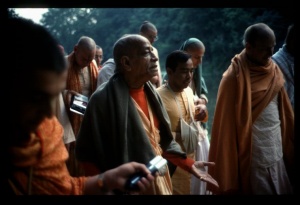SB 9.2.15: Difference between revisions
m (1 revision(s)) |
(Vanibot #0018 edit: make synonym terms in Sanskrit italic in SB - Vanisource) |
||
| Line 1: | Line 1: | ||
{{info | {{info | ||
|speaker= | |speaker=Śukadeva Gosvāmī | ||
|listener=King | |listener=King Parīkṣit | ||
}} | }} | ||
[[Category:Srimad-Bhagavatam - Canto 09 Chapter 02]] | |||
[[Category:Bhagavatam Verses Spoken by Sukadeva Gosvami - Vanisource|090215]] | |||
<div style="float:left">'''[[Srimad-Bhagavatam]] - [[SB 9|Ninth Canto]] - [[SB 9.2: The Dynasties of the Sons of Manu|Chapter 2: The Dynasties of the Sons of Manu]]'''</div> | |||
<div style="float:right">[[File:Go-previous.png|link=SB 9.2.14]] '''[[SB 9.2.14]] - [[SB 9.2.16]]''' [[File:Go-next.png|link=SB 9.2.16]]</div> | |||
{{RandomImage}} | |||
==== TEXT 15 ==== | ==== TEXT 15 ==== | ||
<div | <div class="verse"> | ||
kaviḥ kanīyān viṣayeṣu niḥspṛho | :kaviḥ kanīyān viṣayeṣu niḥspṛho | ||
visṛjya rājyaṁ saha bandhubhir vanam | :visṛjya rājyaṁ saha bandhubhir vanam | ||
niveśya citte puruṣaṁ sva-rociṣaṁ | :niveśya citte puruṣaṁ sva-rociṣaṁ | ||
viveśa kaiśora-vayāḥ paraṁ gataḥ | :viveśa kaiśora-vayāḥ paraṁ gataḥ | ||
</div> | </div> | ||
| Line 17: | Line 22: | ||
==== SYNONYMS ==== | ==== SYNONYMS ==== | ||
<div | <div class="synonyms"> | ||
''kaviḥ''—another son, known as Kavi; ''kanīyān''—who was the youngest; ''viṣayeṣu''—in material enjoyments; ''niḥspṛhaḥ''—being without attachment; ''visṛjya''—after giving up; ''rājyam''—his father's property, the kingdom; ''saha bandhubhiḥ''—accompanied by friends; ''vanam''—the forest; ''niveśya''—keeping always; ''citte''—within the core of the heart; ''puruṣam''—the Supreme Person; ''sva-rociṣam''—self-effulgent; ''viveśa''—entered; ''kaiśora-vayāḥ''—a young man not fully in youth; ''param''—the transcendental world; ''gataḥ''—entered. | |||
</div> | </div> | ||
| Line 24: | Line 29: | ||
==== TRANSLATION ==== | ==== TRANSLATION ==== | ||
<div | <div class="translation"> | ||
Being reluctant to accept material enjoyment, Manu's youngest son, whose name was Kavi, gave up the kingdom before attaining full youth. Accompanied by his friends, he went to the forest, always thinking of the self-effulgent Supreme Personality of Godhead within the core of his heart. Thus he attained perfection. | Being reluctant to accept material enjoyment, Manu's youngest son, whose name was Kavi, gave up the kingdom before attaining full youth. Accompanied by his friends, he went to the forest, always thinking of the self-effulgent Supreme Personality of Godhead within the core of his heart. Thus he attained perfection. | ||
</div> | </div> | ||
__NOTOC__ | |||
<div style="float:right; clear:both;">[[File:Go-previous.png|link=SB 9.2.14]] '''[[SB 9.2.14]] - [[SB 9.2.16]]''' [[File:Go-next.png|link=SB 9.2.16]]</div> | |||
__NOTOC__ | |||
__NOEDITSECTION__ | |||
Revision as of 08:38, 1 December 2017

A.C. Bhaktivedanta Swami Prabhupada
TEXT 15
- kaviḥ kanīyān viṣayeṣu niḥspṛho
- visṛjya rājyaṁ saha bandhubhir vanam
- niveśya citte puruṣaṁ sva-rociṣaṁ
- viveśa kaiśora-vayāḥ paraṁ gataḥ
SYNONYMS
kaviḥ—another son, known as Kavi; kanīyān—who was the youngest; viṣayeṣu—in material enjoyments; niḥspṛhaḥ—being without attachment; visṛjya—after giving up; rājyam—his father's property, the kingdom; saha bandhubhiḥ—accompanied by friends; vanam—the forest; niveśya—keeping always; citte—within the core of the heart; puruṣam—the Supreme Person; sva-rociṣam—self-effulgent; viveśa—entered; kaiśora-vayāḥ—a young man not fully in youth; param—the transcendental world; gataḥ—entered.
TRANSLATION
Being reluctant to accept material enjoyment, Manu's youngest son, whose name was Kavi, gave up the kingdom before attaining full youth. Accompanied by his friends, he went to the forest, always thinking of the self-effulgent Supreme Personality of Godhead within the core of his heart. Thus he attained perfection.